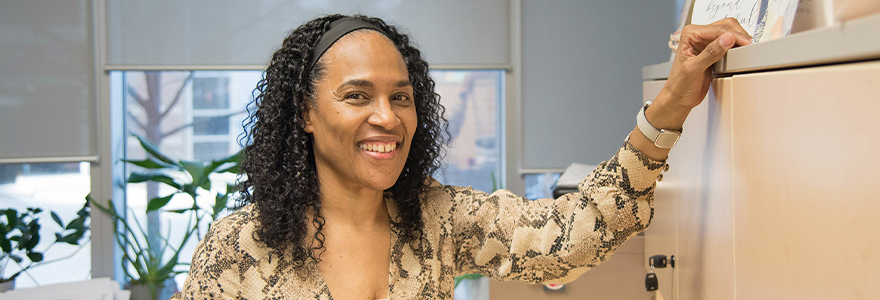Medicine combines love of science with helping people for Barton-Forbes

By Amanda Taccone
Lawson Health Research Institute
In recognition of International Day of Women and Girls in Science, Dr. Michelle Barton-Forbes, associate scientist at Lawson Health Research Institute and associate professor in the Department of Paediatrics at Schulich School of Medicine & Dentistry, shares her journey and advice for young women who are considering a career in science, technology, engineering and math (STEM).
“As a child I had a curious mind and I was always asking questions, wanting to figure out how things worked. As I got older, I also wanted to know how we could make things better,” said Barton-Forbes, who is also Division Head of Infectious Diseases at Children’s Hospital at London Health Sciences Centre (LHSC). “I found a love for math and that had me wanting to solve puzzles and understand statistics from an early age.”
Barton-Forbes also loved chemistry and considered engineering, but said she was a people person. After spending some time in hospital interacting with doctors and nurses, she decided medicine would be the best way to combine her love of science and helping people.
Today she is using her love of math and science in her work at LHSC.
Growing up in Jamaica, she saw first-hand the impact of infectious diseases on children in the developing world, where immunizations like those to prevent bacterial meningitis had not yet been introduced. Now her research focus is on infections in vulnerable patients such as neonates, including congenital and perinatal infections, like cytomegalovirus and herpes, preventable diseases like COVID-19 in children, and studies in the Black community that address natural and vaccine immune responses to COVID-19. In her role as Chair of the Canadian Paediatric Society’s Infectious Disease and Immunization Committee, she also contributes to the development of national guidelines addressing treatment and prevention of infections in children.
“As a child I had a curious mind and I was always asking questions, wanting to figure out how things worked. As I got older, I also wanted to know how we could make things better.” - Dr. Michelle Barton-Forbes
Having women in science is about equity, but also about efficiency, said Barton-Forbes.
“There should be more interest in advancing more women in STEM, otherwise we aren’t maximizing on the talents and capabilities of a significant proportion of our population,” she said.
Barton-Forbes pointed out that women bring unique perspectives to research. While she believes that women already in STEM are crucial in encouraging the younger generation by sharing their energy and passion, more needs to be done.
“I think the approach has to be not just at an individual level, but also at the institutional, national and global level to try to promote interest in STEM,” Barton-Forbes said.
More STEM programs, starting at the elementary school level, as well as targeted prizes, awards and scholarships are essential, she said, as well as removing additional barriers for equity-deserving populations.
“When we speak about women in science, I think there has to be a greater intentional effort to ensure that ethnic minorities are included and supported.”
And young women need to see representation at the highest levels of leadership as well, she said.
“We need more role models that can encourage at all levels, and we need programs that are deliberate in creating opportunities that improve access and ensure mentorship.”
When asked about advice for women starting a career in science, Barton-Forbes offered the following:
- Connect to a community of mentors to share ideas and find a sponsor or coach.
- Believe in yourself. Don’t second guess your ability.
- Capitalize on conferences and networks to keep up-to-date on new opportunities.
- Don’t be afraid to stand out and ask questions.
Reflecting on her own journey as a woman in science, Barton-Forbes is proud of her work.
“The research I do explores risk factors and outcomes, allowing us to identify those most likely to get a disease and predict those likely to do poorly. This helps us target our treatment and prevention to those most in need and therefore make a bigger difference. I get to see the impact of my research on children’s lives. This brings me the greatest joy because it means I am changing their trajectory and improving outcomes. Not only that, I can identify who is at risk and help prevent it from happening.”








